How To Create Custom Room In Creative Destruction
Every item on this page was chosen by a Town & Country editor. We may earn commission on some of the items you choose to buy.
Ever since Hamilton, the phrase "The Room Where It Happens," the title of one of the musical's best-known numbers, has transcended the Broadway stage to become synonymous with the dark arts of trafficking and maintaining power. Whatever "it" may be to you—the deal to forge an alliance, the handshake to secure loyalty, the craven exchange of goods and money for personal advantage—the phrase understands that in the ruthless contact sport of politics a seat at the table is the only currency that matters.
When former national security adviser John Bolton was looking to name his upcoming book exposing the inner workings of the Trump Administration, he didn't pick the sort of dignified title usually associated with career bureaucrats. He chose something more tantalizing: The Room Where It Happened: a White House Memoir. In Hamilton, which is coming to movie theaters next fall, the song epitomizes the dirty business of governance, the drive to win at all costs despite the consequences, or the law.
But, what if not all power corrupts absolutely? Are there rooms where the "it" isn't self-dealing, but the discovery of talent? Or the fulfillment of artistic promise instead of campaign pledges? Where favors aren't traded for the enrichment of the personal but of the public good? Are there rooms where conversation flourishes, genius thrives, and beauty takes up permanent residence?
We looked and we found them. They exist from coast to coast, in spaces private and public, both far away from traditional centers of influence and hiding in plain sight in the thick of things—in an artist's studio, a newspaper's podcast, a bohemian library, an industry canteen. Perhaps it's time to re-think not just the rooms where power happens, but power itself.
The Power Boardroom
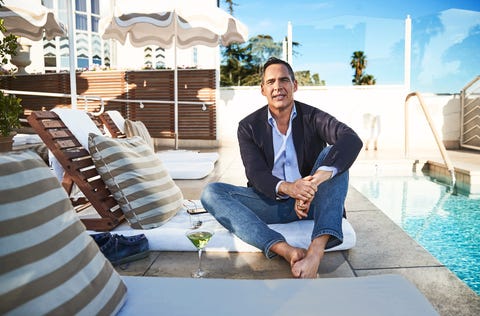
Dewey Nicks
Jeff Klein, hotelier, at his command center: the pool of the Sunset Tower
"Movie stars. Billionaires. Tech moguls. They're all drawn to this place. It's not rocket science, but perhaps it's the sweeping views that connect people to a deep Hollywood history. I can't really answer why the pool feels so important—it just does." —Klein
The Power Platform
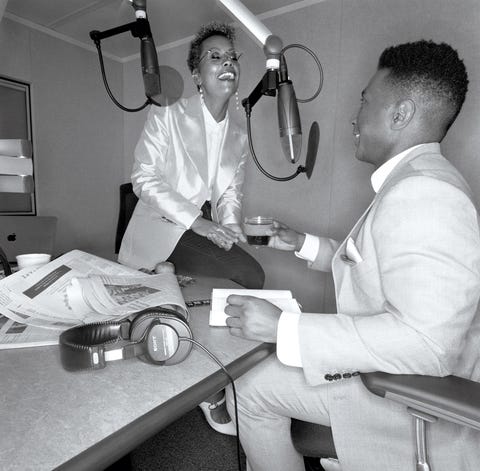
Alexei Hay
Jenna Wortham & Wesley Morris, journalists, stirring the pot on their New York Times podcast
"To be inside the Still Processing studio with Jenna and Wesley is to be witness to an intimate conversation of electric new ideas and outrageous revelations—a conversation you don't remember having heard the beginning of but that you hope never ends. As a guest, you feel bad about interrupting them, since the absolute best pieces of it come from their relationship with each other and with the world. I was proud to be a guest on the show, but the highlight of their podcast is listening to it and wondering how you could have missed the very suddenly obvious perspectives (Oh yeah, how did I not think of that?) that those two seem to pull both out of the air and from their innermost reaches." —Taffy Brodesser-Akner
The Power Sanctuary
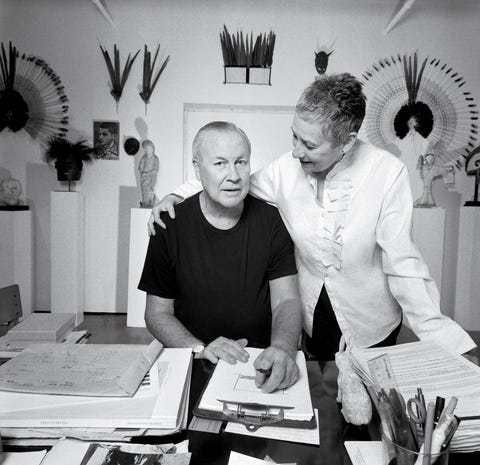
Jenna Wortham wears a Dolce & Gabbana blazer ($3,445) and a lafayette 148 New York shirt ($348)
Robert Wilson & Cristina Grajales, artist and gallerist, weaving their magic in his studio
"You looking for Glamour Closet?" was not the first thing I expected to hear when I arrived to meet Robert Wilson, but it was oddly fitting. The avant-garde director occupies a singular position in the art world, and he chose to set his home, and the operational arm of his Watermill Center, not in a loft in Soho or a warehouse in Red Hook but in the no-man's-land of the Garment District. On the 10th floor of an otherwise ordinary building, he is surrounded by objects collected over a lifetime: Han Dynasty sculptures, an ancient Burmese basket, dozens of chairs. "It's Bob's mind," says his friend, the art dealer Cristina Grajales, who recently persuaded him to create a collection of glassworks, his first love (the pieces were produced by the Corning Museum). Wilson likes to say he can work anywhere ("comfort is a state of mind"), but it's here that he gets to play Prospero, the sorcerer at the heart of a creative universe. —Erik Maza
The Power Incubator
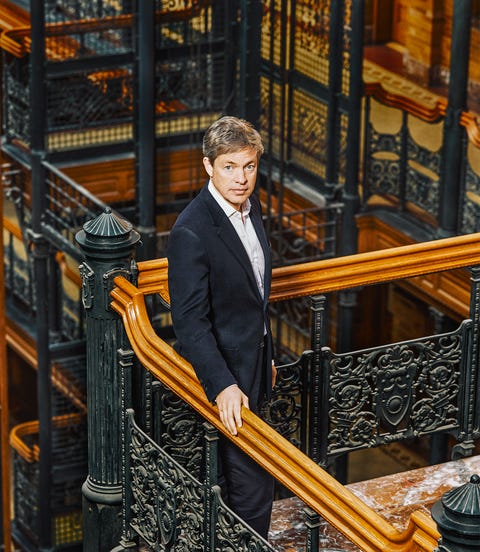
Adam Amengual
Nicolas Berggruen, philanthropist, at the nerve center of his think tank
"Although built more than 100 years ago, the Bradbury Building is about the future—it was the future when it was created, it was the future in the movies, and it is the future again, animated by its occupants, a symbol of a city that never stops evolving. Great edifices live across ages." —Berggruen, philanthropist, and founder of the Berggruen Institute
The Power Go-See
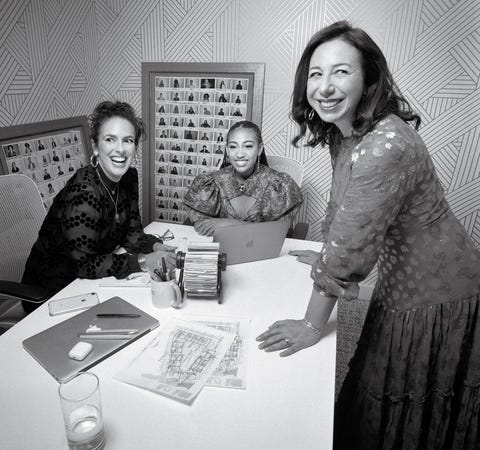
Alexei Hay
Nicole Vecchiarelli & Andrea Oliveri, starmakers, in the dream factory: the Special Projects conference room
What if Schwab's pharmacy were reborn in a former music studio in Soho designed by the decorator who did the Wing? That imaginary drugstore counter is where aspiring actors find themselves these days when participating in the time-honored tradition known as the meet-and-greet. Their modern-day countermates for these sometimes career-starting introductions are Nicole Vecchiarelli and Andrea Oliveri two former magazine editors who established their company, Special Projects, four years ago and quickly became equal parts image strategists and power event planners. A stop at the newly expanded Special Projects offices—designed by Hilary Koyfman of Hilko Designs—is an essential part of a young performer's or influencer's schedule. Actress Lexi Underwood checked in with Vecchiarelli and Oliveri right before the premiere of the next Reese Witherspoon TV juggernaut, Little Fires Everywhere, which also stars Underwood and Kerry Washington. —Stellene Volandes
The Power Refuge
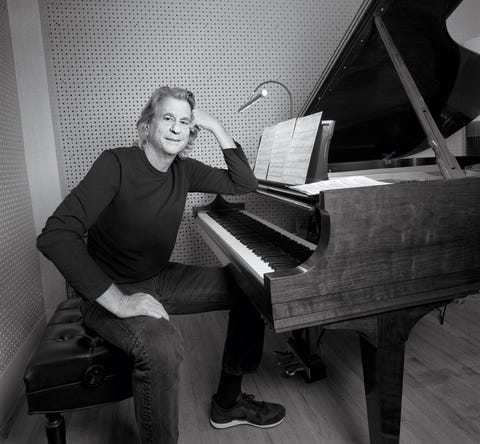
Alexei Hay
David Rockwell, architect, in his piano room, composing the look of Broadway
Nestled in a former print room one floor below the Rockwell Group's NYC office, just off Union Square, there is a sound-proofed, den-like space with a restored 1959 Steinway. Like its debonair occupant, the recently renovated room manages to be at once humble and theatrical. Rockwell, who has designed everything from Broadway sets (Hairspray, Kinky Boots) to buzzy restaurants (Oceans, Nobu, Union Square Café), describes the cozy haven as "a bizarre but very warm man cave." Beyond all the personal ephemera—like a framed Al Hirschfeld cartoon of Hairspray—is the piano, an instrument Rockwell has practiced, on and off, his entire life. Five years ago he decided to take his playing more seriously, and now, in his downtime, you can usually find him here, behind the keys. On a recent visit he mentioned that he was working on several pieces at once: Chopin's "Revolutionary Etude," a Clara Schumann composition, and a couple of Billie Eilish songs to play with his 17-year-old daughter. —Spencer Bailey
The Power Salon
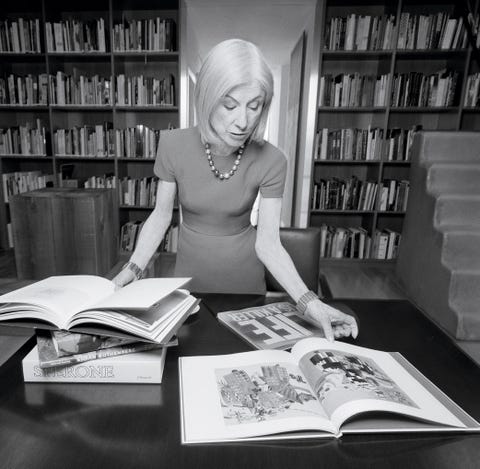
Alexei Hay
Angela Westwater, gallerist, rules downtown bohemia from her library
"We've been working on this library for 45 years. You'll notice there is a real system and an archivist. But sometimes, after an opening, some of us will come up here for drinks and Chinese dumplings—and it works out very nicely, too!" —Westwater
The Power Canteen
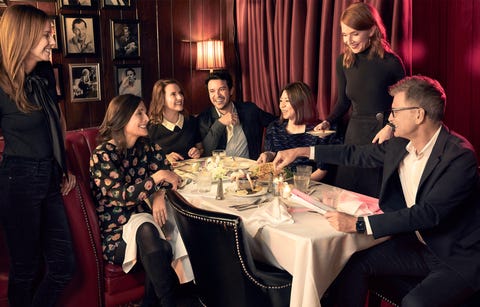
Miller Mobley
HBO Max's Brain Trust suits up for the streaming wars at the Smoke House restaurant
When the new streaming platform launches in May, it will feature heavy-hitting programming, including a movie starring Meryl Streep directed by Steven Soderbergh, a comedy series produced by Issa Rae, and a Gossip Girl reboot. The ambitious slate has been painstakingly conceived, workshopped, and celebrated over wedge salads, martinis, and fries in the red leather booths at the Smoke House, a clubby Burbank institution since 1946. "L.A. tends to lose a lot of its history rather than celebrate it," says chief content officer Kevin Reilly. "That's what makes the Smoke House so special." The classic vibe is a throwback to Hollywood's Golden Age for a group that's at the forefront of entertainment's next frontier—and that's part of the reason they feel so at home. Head of original content Sarah Aubrey says, "The Smoke House is a testimony to endurance. If you do something well, people will stick with you. That's why this place is still here after all these years." —Adam Rathe
Grooming by Maital Sabban at Tracey Mattingly (Klein); Grooming by Mary Guthrie at Artists by Timothy Priano (Wortham, Morris); Hair by Clara Leonard (Underwood). Makeup by Nick Barose for Giorgio Armani Beauty at Exclusive Artists (Underwood). Makeup by Kerrie Jordan (Vecchiarelli, Oliveri). Props Styled by Alex B. Chapman; Hair and Makeup by Annette Chaisson for Bobbi Brown at Exclusive Artists L.A. (Aubrey). Grooming by Crystal Tran for Hanz de Fuko at Exclusive Artists (Chavez). Hair and Makeup by Harper for Skyn Iceland at Exclusive Artists (O'Connell). Hair and Makeup by Jeffrey Paul for Amika Haircare at Exclusive Artists (Henderson). Grooming by Jeni Chua for Drunk Elephant and Living Proof at Exclusive Artists (Reilly). Hair and Makeup by Leah Rial for Cle De Peau and Philip B. Haircare at Exclusive Artists (Makkos)
This story appears in the April 2020 issue of Town & Country. SUBSCRIBE NOW
Erik Maza Style Features Director Erik Maza is the Style Features Director at Town & Country, overseeing the magazine's coverage of fashion, design and society, subjects he also handled earlier as an editor at W Magazine and Women's Wear Daily.
This content is created and maintained by a third party, and imported onto this page to help users provide their email addresses. You may be able to find more information about this and similar content at piano.io
How To Create Custom Room In Creative Destruction
Source: https://www.townandcountrymag.com/style/home-decor/a31077261/creative-power-hubs-interior-design/
Posted by: bensonhaveracter.blogspot.com

0 Response to "How To Create Custom Room In Creative Destruction"
Post a Comment